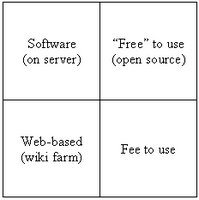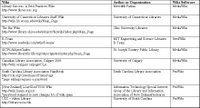Your Mission: Choose a Wiki for your Library
 Your mission, should you choose to accept it, is to select, evaluate, and implement a wiki for a library project. You have only a few hours! Here is a quick guide.
Your mission, should you choose to accept it, is to select, evaluate, and implement a wiki for a library project. You have only a few hours! Here is a quick guide.What to read? Some useful articles on wikis in the library literature:
Brenda Chawner and Paul H. Lewis. “WikiWikiWebs: New Ways to Communicate in a Web Environment.” Information Technology and Libraries 25, no. 1 (2006): 33-43.
Current article on wikis comparing "...three wiki engines and seven case studies of real-world library and library-related Wild [wiki] applications." Selection criteria for wikis is discussed.
Fichter, Darlene. “Using Wikis to Support Online Collaboration in Libraries.” Information Outlook 10, no. 1 (January 2006): 30-31.
Frumkin, Jeremy. “Digital Libraries: Modern Practices, Future Visions. The Wiki and the Digital Library.” OCLC Systems & Services: International Digital Library Perspectives 21, no. 1 (2005): 18-22.
Mattison, David. “Quickiwiki, Swiki, Twiki, Zwiki, and the Plone Wars.” Searcher 11, no. 4 (2003): 32-48.
Excellent glossary and extensive links, the article reads like an HTML page instead of an essay. Not easy to read. Three interviews are conducted in the article, including one with Bo Leuf, author of The Wiki Way (2001), a book on wikis.
What to quote? In preparing a case for wiki use:
"Have you ever edited a Word document that has passed through a half dozen hands with 'track changes' on? It’s painful" (Fichter 2006). Ha, ha : )
"Moving from traditional Web site development to a Wiki... requires a substantial investment of time and effort. ...It might be useful to identify a short-list of potential Wiki engines, and install each on a trial basis before making a final decision" (Chawner and Lewis 2006, 8 of 15).
Decisions: although some authors (Chawner and Lewis 2006) report that other researchers have identified six types of wikis based on read/edit/access permissions, the following matrix represents four decisions:

Criteria: the list of criteria available when choosing a wiki is extensive (Chawner and Lewis 2006). Selected criteria appear:
-W3C standard compliant (XHTML and CSS)
-Database support
-RSS read and publish
-Read and edit control
-Page history (version control)
-Open source; free of advertisements
-Spam blocking options
-Extensive documentation supporting the wiki
-Mature development
-Community support
-Use by other libraries
By "community support," I mean that there are plug-ins, mods, etc. and new ones keep coming for use with that wiki; a forum is offered where you can seek advice, etc.
Selection: What are other libraries using in terms of wikis? Here is a list of wikis mentioned in the articles I read:

Summary: a few key points to make the case for a wiki.
The library literature agrees that wikis could be used by libraries to create “knowledge bases” (Fichter 2006, 31; Frumkin 2005, 19).
You will want a plan in place to encourage staff (or patrons) to use the wiki. Chawner and Lewis explain how to create the "right conditions" for wiki use.
Resources: wiki comparison
1. WikiMatrix
http://www.wikimatrix.org/
Allows a person to choose and compare multiple wiki applications, open source and commercial, side-by-side. Very helpful.
2. Wikipedia – Comparison of wiki software
http://en.wikipedia.org/wiki/Comparison_of_wiki_software
Offers a long table comparing several features of "every" wiki available. Of course, when you read any Wikipedia article, it is a good idea to check the link "Related changes" (left-hand side in Wikipedia) to view the edits.
3. WikiWikiWeb, Ward Cunningham (a Wiki pioneer)
http://c2.com/cgi-bin/wiki
The "first" wiki page (if I read one article correctly) that covers all aspects of wikis. A strong community is behind this wiki, and the number of resources seems endless, but it would be a good place to visit if one had a technical question.
---------
Photograph: Can you spot the deer? I just like the picture that I took in BC's Interior. It has nothing to do with wikis.


